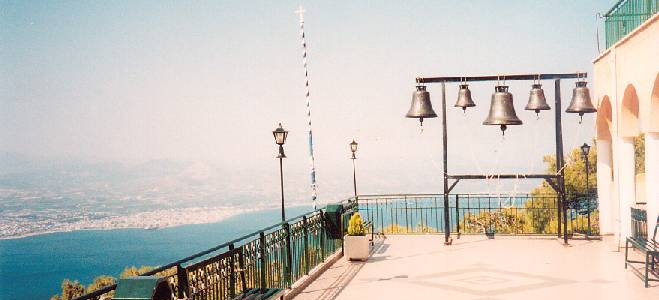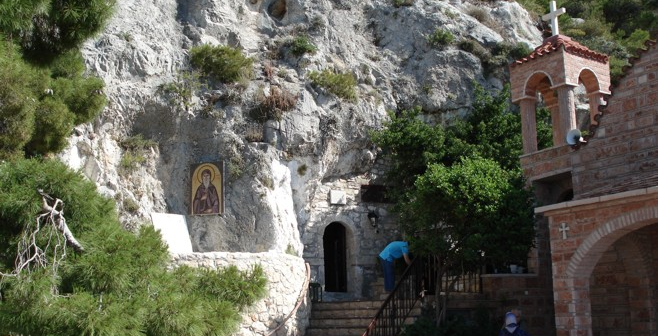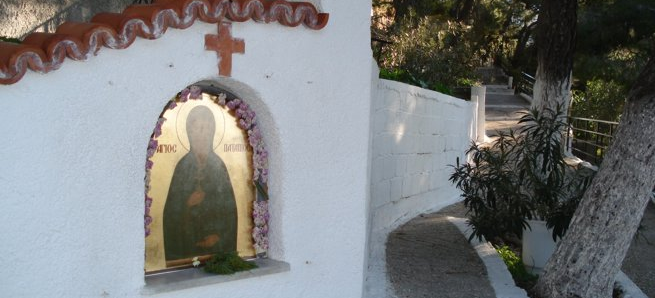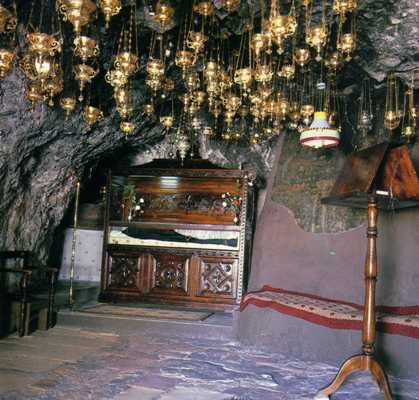
At a location of breathtaking view, on a steep slope of Gerania Mountains, above Loutraki and near Corinth lies Saint Patapios monastery.
The monastery is established in a building complex, which constitutes an extension of the ancient hermitage of the 12th century. The monastery was founded in 1952 and extended around the hermitage through labors and sacrifices by Fr. Nectarios Marmarinos, the Chancellor of the Holy Metropolis of Corinth. The view and its physical and religious beauty rewards the visitor. Today, it functions as a convent with significant charitable and social work, such as the operation of a women’s nursing home.
The most important reward for the pilgrim is the holy relic of St. Patapios the wonderworker (celebrated on December 8). Filled with fragrance and miraculous grace, he adorns and protects the holy monastery. Crowds of pious pilgrims from all over Greece come here to venerate the saint. The relic is exposed in reverence in a wooden urn, located in the depth of a natural cave, and reveals to the pilgrim the true destination of our existence. St. Patapios’s cave is near the Dormition of the Theotokos church, where lies the icon of Panagia Eleousa.

The holy relic was found in a wonderous way by the priest Constantinos Sousanis. In 1904, a group of Loutrakiotes led by their priest excavated the cave in order to broaden the space. As they knocked down a built terrace at the west of the cave, they discovered the holy relic incorruptible and fragrant, while on top of it they found a wooden cross and byzantine coins. The altar table and the table of oblation are in a hewn cavity of the rock.
Moreover, at the monastery one can find St. Hypomone’s holy skull. Saint Hypomone, before becoming a nun, had been Empress Helen, the mother of the last Eastern Roman emperor, Constantine Palaiologos. She became an empress as the wife of Emperor Manuel II Palaiologos and had put St. Patapios’s relic under her protection.

After the Fall of Constantinople in 1453 by the Turks, Angelis Notaras, a relative of the Emperor and Saint Hypomone’s nephew, brought Saint Patapios’s incorruptible body to Loutraki, Corinth, in order to protect it in a hermitage. The hermitage was later on desolated and so the Saint Patapios’s holy relic remained in obscurity for centuries, until God’s providence led to its discovery, 100 years ago.
Saint Patapios, the desert dweller
Saint Patapios was so named, because he lived isolated in the desert, eschewing the noise of secular matters. During the 4th century, he was born in Thebes, Egypt, of pious Christian parents, next to whom he was raised with care and diligence and was taught the Holy Scriptures.
When he came of age, Saint Patapios left for the desert. It was the time, when anchoritism and monastic life in that region of Egypt was at the rise. Very quickly, he was distinguished and became popular for his great asceticism and virtue; many people came to him to spiritually benefit from the acquaintance and fellowship with him.

St. Patapios so loved the peace of the desert that he began to feel unhappy, seeing all those people coming to him, praising and admiring him for his ascetic life and his holiness. Saints never permit themselves to believe what people believe of them; if they do so, they have lost everything. This is why the Saint, after having lived years in the Thebaid desert, he left and went to Constantinople, in order for his traces to disappear.
In Constantinople, Saint Patapios lived in the pilgrimage site of Theotokos of Blachernae. There he lived unknown and poor through many hardships and spiritual contemplation, like in the desert, reaching the point where he did miracles. Afterwards, he founded the monastery of Egyptians in Constantinople, where he peacefully fell asleep in the Lord.
The memory of the Saint is celebrated on October 8, while on Easter Tuesday the finding of his holy relic is observed.
Surrounding area
Saint Patapios monastery is located at an altitude of 650-700 meters; it is a convent and currently hosts 40 nuns. It is 14 km from the famous spa of Loutraki and about 85 km from Athens.
Τel.: 27440-22496, 22493
Saint Patapios monastery, 203 00 Loutraki, Greece





